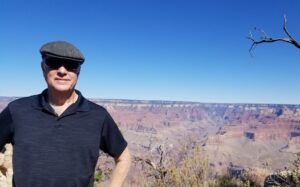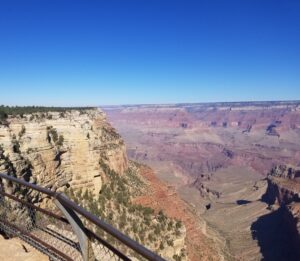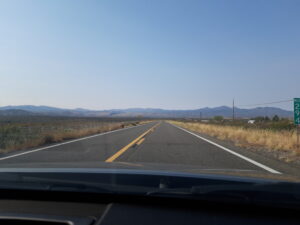by James Scott Bell
@jamesscottbell
In last week’s post I mentioned I would be driving all day, and that was quite true. Mrs. B and I needed to get out, get away, do something different. Cindy suggested we motor to the Grand Canyon, just to spend a day looking at something big, majestic, unsullied and quiet.
Turns out my wife’s instinct was right on the money. Scientific research suggests that several benefits flow from the experience of awe—“from happiness and health to perhaps more unexpected benefits such as generosity, humility, and critical thinking.”
In The Nature Fix: Why Nature Makes Us Happier, Healthier, and More Creative, Florence Williams emphasizes the need to get away from anthrophone. This refers to the soundscapes created by things like cities, cars, planes, machines, lawn mowers, sirens, neighbors with a teenager who is taking up the drums, and such like. The thing is, that noise goes into our brains and triggers our “fight or flight” receptors. Over time this can create chronic stress, a very real danger to our collective health and well-being.
On the other hand, natural sounds like a gentle breeze, flowing water, and singing birds are interpreted by our brains as relaxing and rejuvenating. In this state we are more creative and less hostile toward other human beings (hmmm…maybe people should only be allowed to tweet when in a forest).
The Grand Canyon is something to behold. If you’ve never been there, put it on your bucket list. Plan to spend at least four hours just looking at it. You can drive to various viewpoints, or take a shuttle bus tour, a helicopter flight, or even ride a mule for an overnight stay at the bottom. We opted for the viewpoints.
Grand Canyon = Awesome. Good for the soul.
Writing awesomely = Good for the reader.
What does it mean to write awesomely? At the very least, it means giving your readers more than a by-the-numbers story. Help them feel something beyond numbers. Tap into the inspirational. After all, that’s what the great myths were for. A hero overcomes tremendous odds so that we, the audience, might exhibit the same courage on our own journey through life.
Heracles kills the Hydra. He does so with a mixture of courage, strength and thought. Since cutting off one of the Hydra’s heads means two more heads replace it, Heracles has his nephew, Iolas, put a torch to each cut to cauterize it. And thus he dispatches the monster. Hey, maybe you can do the same when it seems your bills are like Hydra’s heads.
Or maybe you face a seemingly insoluble problem. If you approach it wisely, like Theseus in the Labyrinth, you can kill your personal Minotaur and find a way back to the world.
In our modern storytelling, we have mythic heroes of various stripes teaching us valuable lessons. Charlotte Vale (Bette Davis) in Now, Voyager, shows us that inner strength and beauty can be developed even under the worst of circumstances. Atticus Finch teaches us that sometimes a losing battle is morally imperative. Heck, even Dirty Harry Callahan shows us that sometimes you have to do whatever it takes to save the innocent—especially a busload of children in the grip of a mad killer. Do you believe that? “Well do ya, punk?”
So one of the ways to be awesome is to be intentional about the meaning of your story. In my book, The Last Fifty Pages, I talk about the idea of a “life lesson learned.” My friend Chris Vogler, in The Writer’s Journey, calls this the “Return With the Elixir.” It’s what takes a story from tale to myth, from entertainment to exaltation. Why not go for it, every time out?
To prepare, take a little time each day to get away from the anthrophone. There are abundant apps and sites with nature sights and sounds. A fifteen-minute break every now and then seems almost a health mandate these days. So get quiet, forget about Twitter, and maybe the boys in the basement will mix you some elixir.
What is awesome to you? What natural sites have lifted your soul?
What works of fiction have elevated you, given you a takeaway that is more than entertainment?



